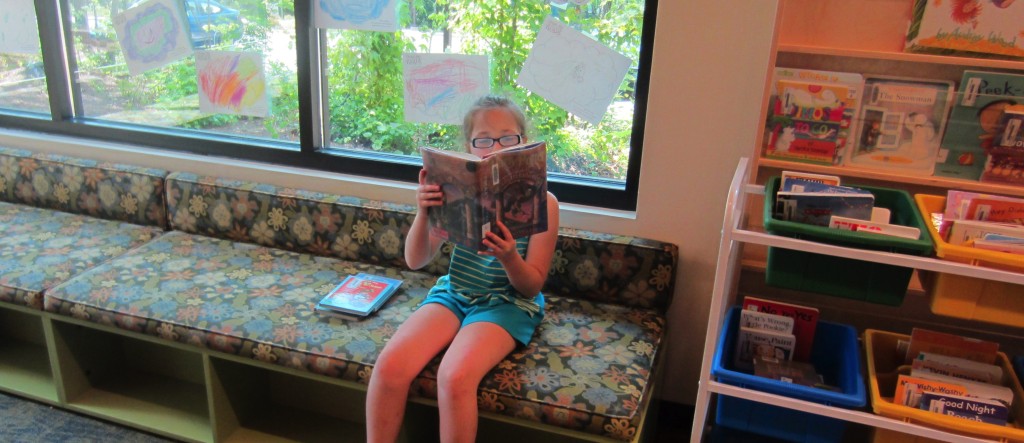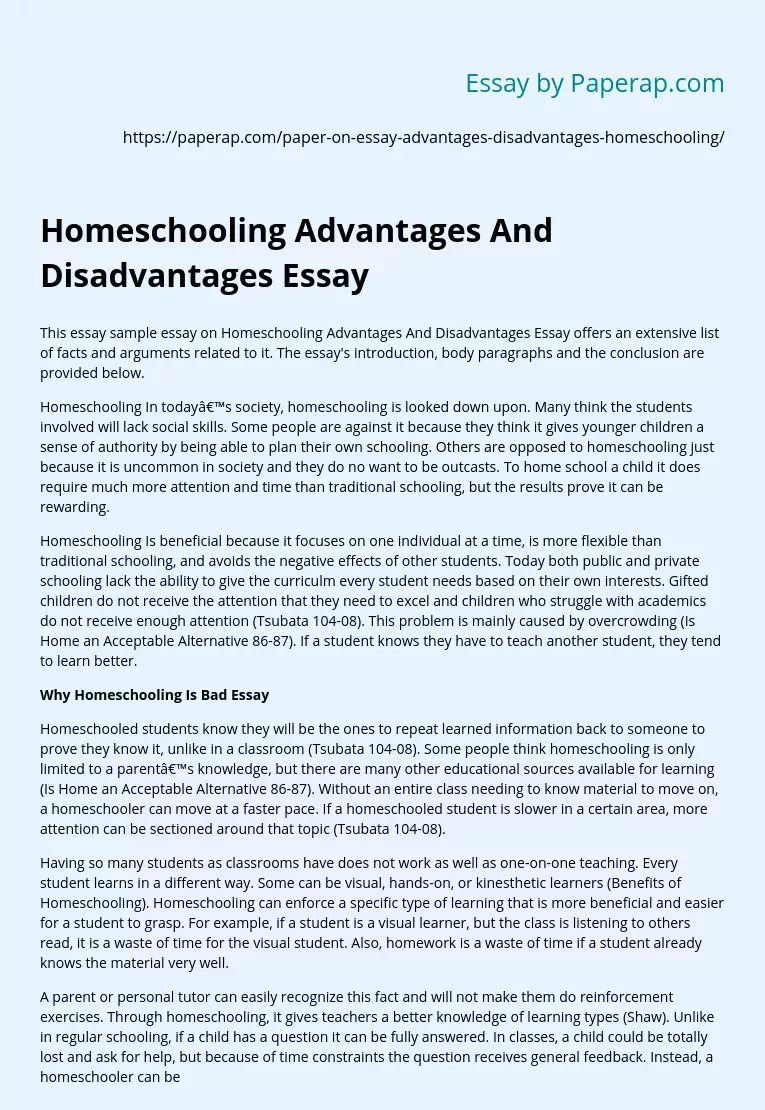Homeschooling, Its Advantages and Disadvantages Essay
Nowadays, education is extremely important because it provides the representatives of the general public to receive the knowledge needed to live an independent life to the fullest. At school, children have an opportunity to learn how to communicate with different people, obtain basic skills and knowledge required for further education or work, and become real members of their communities. However, more and more parents today focus on the benefits of homeschooling.
They believe that such an approach provides their children with the possibility to learn better and base their decision on pedagogical and/or family-related reasons (Guterman & Neuman, 2017). However, even though homeschooling provides freedom, flexibility, and control over the activities aligned with the learning process, it prevents a child from socialization, requires many resources, and excessively increases togetherness.
Homeschooling is rather advantageous because it provides the representatives of the general public with an opportunity to experience freedom. This point includes both the freedom to decide what to do and when and the freedom from adverse situations. For instance, parents have the possibility to change the planned organization of lessons if they are under the pressure of particular circumstances or believe that a child needs to focus on something more.
In addition to that, receiving education at home, children have the possibility to avoid bullies and problems with peers, which influence their mental state negatively. It is also possible to consider religious freedom. In this way, parents are free to decide whether religion should be included in the curriculum or not.
A flexible schedule and an opportunity to change the pace of learning is another advantage of homeschooling. Parents can decide what information to discuss and how to do it. In this way, they can provide their children with “wonderful educational experiences” and ensure “a very stimulating learning environment” (Fedele, 2010, para. 62). Thus, kids are likely to have positive views on education.
Homeschooling provides a lot of control to parents. They are able to make decisions regarding children’s curriculum, diet, and extra-curriculum activities. As a result, parents can devote more hours to studying and ensure that their children eat healthy food (Guterman & Neuman, 2017, p. 303). Thus, homeschooling is the best option for children who have some health issues.
Nevertheless, it is more difficult for those who receive education at home to enter society. Socialization is critical for the future because people need to constantly interact with one another. The school allows children to learn coping mechanisms and understand how to approach various people.
Being educated by parents only, children fail to learn all the information they can receive at school. As a rule, people are good at a limited number of subjects, which means that parents tend to lack knowledge in various spheres. As one of the individuals who practiced homeschooling said, “I’m English, their dad is political science. There are some things we don’t know” (Martin, 2013, para. 24). Still, the situation can be improved if to involve the community but not only parents (Martin, 2013). In this way, practices similar to those maintained at school will be held.
Moreover, family relations can be worsened by excessive togetherness. Spending almost all the time with one another, parents and children may become tired and unwilling to communicate. Conflicts may occur without any significant reasons. This rationale may be appropriate only if a child is “not socially and emotionally ready for school” (Fedele, 2010, para. 7).
Thus, homeschooling is a great option to receive an education without attending school, but it is not its substitute. It seems to be better for children to follow the way of the majority to be aligned with them in the future. Parents are not able to teach everything, they need some time for themselves, and children should be socialized. Homeschooling is the best option if a family faces issues, but it is not the best for a general situation.
Guterman, O., & Neuman, A. (2017). Different reasons for one significant choice: Factors influencing homeschooling choice in Israel. International Review of Education, 63 (3), 303-318.
Fedele, R. (2010). When it comes to schooling, there’s no place like home . Web.
Martin, M. (2013). Parents on the pros and cons of homeschooling . Web.
- Chicago (A-D)
- Chicago (N-B)
IvyPanda. (2020, August 31). Homeschooling, Its Advantages and Disadvantages. https://ivypanda.com/essays/homeschooling-its-advantages-and-disadvantages/
"Homeschooling, Its Advantages and Disadvantages." IvyPanda , 31 Aug. 2020, ivypanda.com/essays/homeschooling-its-advantages-and-disadvantages/.
IvyPanda . (2020) 'Homeschooling, Its Advantages and Disadvantages'. 31 August.
IvyPanda . 2020. "Homeschooling, Its Advantages and Disadvantages." August 31, 2020. https://ivypanda.com/essays/homeschooling-its-advantages-and-disadvantages/.
1. IvyPanda . "Homeschooling, Its Advantages and Disadvantages." August 31, 2020. https://ivypanda.com/essays/homeschooling-its-advantages-and-disadvantages/.
Bibliography
IvyPanda . "Homeschooling, Its Advantages and Disadvantages." August 31, 2020. https://ivypanda.com/essays/homeschooling-its-advantages-and-disadvantages/.
- Is Homeschooling Better?
- Advantages and Disadvantages of Homeschooling
- Selection of Literature on Homeschooling
- Homeschooling Growth in the United States and Its Legalization
- The Success of Homeschooling and How the Program Can Be Increased
- Homeschooling is a Viable Alternative to Public School
- Homeschooling as a Valid Alternative to Formal Education
- Homeschooling as an Option for Formal Education
- Homeschooling Factors in America
- Church's Role in Encouraging Homeschool Education
- English vs. Russian Education Throughout History
- Bureaucracy and Accountability in Higher Education
- Finland's and South Korea's Education Systems
- Common Core State Standards Initiative: Pros and Cons
- Romanian Education Strategies and Management
- Trying to Conceive
- Signs & Symptoms
- Pregnancy Tests
- Fertility Testing
- Fertility Treatment
- Weeks & Trimesters
- Staying Healthy
- Preparing for Baby
- Complications & Concerns
- Pregnancy Loss
- Breastfeeding
- School-Aged Kids
- Raising Kids
- Personal Stories
- Everyday Wellness
- Safety & First Aid
- Immunizations
- Food & Nutrition
- Active Play
- Pregnancy Products
- Nursery & Sleep Products
- Nursing & Feeding Products
- Clothing & Accessories
- Toys & Gifts
- Ovulation Calculator
- Pregnancy Due Date Calculator
- How to Talk About Postpartum Depression
- Editorial Process
- Meet Our Review Board

The Pros and Cons of Homeschooling
Fabio Principe / iStock / Getty Images Plus
Choosing to homeschool your kids is not a new concept. But during the COVID-19 pandemic, the phrase “school choice” took on a whole new meaning as more and more parents considered homeschooling a solution for their families.
To curb the spread of the virus, school districts around the country offered a variety of educational possibilities , from in-person school with masks to full online school to a delayed start to the academic year to a hybrid model that offered some days in a physical classroom and other days virtually.
Even as things opened back up and returned to normal, some schools continued to offer a virtual option. And since some younger kids are still unable to get the vaccine, some families feel uncertain about sending their kids back to brick-and-mortar schools.
UPDATE: November 2022
On October 20, 2022, the Center for Disease Control's Advisory Committee on Immunization Practices voted to add COVID-19 vaccination to the childhood immunization schedule. While the CDC makes vaccine recommendations, each state will determine which ones are required for school entry. The updated schedule is set to be released in early 2023.
If you’re thinking of teaching your child at home for the first time, or you've always considered this option for your family, you likely know there are many pros and cons.
We’ve rounded up a list of common advantages and pitfalls you may encounter—with input from real-world homeschooling parents. As you weigh your decision, give some thought to how each of these might impact your own circumstance and trust that whatever decision you make will be the right one for your family.
Flexibility
Individualized education
Strong relationships
A lot of work
Less time for yourself
Inability to work
Too much togetherness
Missing out on certain opportunities
Facing judgment and bias
Whether you call it self-determination, freedom, or control, one clear advantage of homeschooling is the ability to make your own choices. As a homeschooler, you’ll be able to freely travel or move, include religious teaching in day-to-day learning, and not worry about social pressures or bullying your child may encounter at school.
Plus, in home-based education, all subjects are fair game, from sailing to sewing to science. Practical skills, volunteering , artistic pursuits, and traditional trades can all fall under the broad umbrella of homeschooling. According to some homeschoolers, teachable moments are always happening, and "school" isn't limited to school hours.
Who doesn’t like to set their own schedule? By educating at home, you determine the structure of your day. If your child struggles to wake up by 7:00 a.m., for example, you can start school later. And, since homeschool timing is fluid, you can go ahead and make your child's dentist appointment on a Tuesday at noon.
You even have room to push back a lesson when you (or your kids) just aren’t feeling it. There are many ways to make it up later.
Individualized Education
Every child is different. Unfortunately, in the larger group setting of regular school, teachers can’t always tailor lessons to your child’s unique needs. At home, on the other hand, you can meet your child right where they are, customizing lessons to their particular interests.
Does your younger child need a little extra help with math ? Take an extra 15 minutes to help them understand fractions. Is your older kid into outer space? Start an astronomy unit!
Homeschooling also lets you vary your approach from child to child if you have more than one—in terms of learning styles and grade levels. Plus, you get to celebrate any success or achievement together in real time.
Strong Relationships
The more time you spend with your kids, the more opportunities arise for bonding. If you’ve always wished for more hours in the day as a family, perhaps homeschooling is the boon you’ve been craving.
Positive experiences like fun field trips , a-ha moments in learning, and “recess” at the park can all build closer parent-child and sibling-to-sibling relationships .
In some cases, homeschooling’s flexible schedule can even allow for more time with both parents—if work schedules usually limit time together on weekends or holidays.
A Lot of Work
In addition to the domestic responsibilities of your role as a parent, you’re now a teacher, tutor, curriculum researcher, and principal.
It’s quite possibly the humdinger of all reasons not to homeschool: Teaching your kids at home is simply a lot of work.
Creating, teaching, and grading a day’s or week’s worth of learning on multiple subjects takes serious time and effort. (However, many prepared curriculum packages do exist.) Plus, as delightful as it can be to tailor education to each child’s learning style, this can add to your workload, too.
And if you have younger children at home who aren’t school age, you may also struggle to keep them occupied while you sit down to teach older kids.
Less Time for Yourself
Not surprisingly, the workload of homeschooling—and kids home all day—is likely to leave you with less time for yourself. Some homeschooling parents say they don’t have time to shower, let alone exercise or take care of their own needs.
For parents who are used to a quiet, kid-free environment during the day, this aspect of homeschooling can be a major adjustment.
Inability to Work
All the work of homeschooling is guaranteed to take up hours of your day. Therefore, as a homeschooling parent, you may not be able to work outside the home, or you may have to cut your hours significantly. For some households, this may be a financial deal-breaker.
Too Much Togetherness
While many families find that homeschooling boosts good vibes between siblings and parents, there is such a thing as too much togetherness.
You may find that spending all day, every day, with your kiddos (and they with each other) leads to feelings of frustration or confinement . You may also go through an adjustment period as your kids learn how to view (and respect) you as their teacher.
It’s important to work in breaks, both for yourself and your kids. Or, depending on the resources in your area, you might try a homeschooling co-op or enrichment program one day a week to provide your kids socialization with others outside the family.
Missing Out on Certain Opportunities
Despite the enormous flexibility of homeschooling, in some ways, it can limit opportunities for your child. For high schoolers, for example, a homeschool curriculum may not be able to provide the same variety of electives as a large public school. (After all, most of us don’t have a metal shop in the backyard.)
If your child wants to pursue subjects you can’t easily teach at home, you’ll have to be diligent about seeking alternatives.
The same holds for social opportunities. As a homeschooler, it’s up to you to provide social interaction your child won’t get from school dances, assemblies, and everyday classroom partner work.
Facing Judgments and Biases
Let's be honest: Homeschooling doesn’t necessarily have a reputation for being cool and modern. Unfortunately, plenty of biases and stereotypes exist around homeschooling and the folks who choose it.
If you decide to educate at home, you might get some flak from family members (or even strangers) who think you’re going full Little House on the Prairie mode or that your kids won’t actually learn anything. You may need to develop a thick skin toward other people’s judgments of your decision to educate at home.
A Word From Verywell
When more and more parents are exploring the wide world of homeschooling, it’s wise to look at the many advantages and disadvantages of this type of education.
Do some soul searching and have a serious discussion with your partner about whether this could be the right choice for your child's and family's needs. And don’t forget to find out how your kids feel about the subject! With everyone’s thoughts and feelings on the table, you can determine if homeschooling is best for you and your family.
The Centers for Disease Control and Prevention. ACIP Immunization Schedule Vote .
By Sarah Garone Sarah Garone, NDTR, is a freelance health and wellness writer who runs a food blog.

- Publications
- Get Involved

The Academic and Social Benefits of Homeschooling
Homeschooling works. The roughly 2 million children who currently learn at home join a millennia-old practice supported by many government officials, scholars, college officials, and employers.
While mainstream America has embraced homeschooling as a viable and positive educational option—and as 55 million K-12 students and their parents have been thrust into “crisis-teaching at home”—the angst of some academics over homeschooling has abruptly emerged.
Professors Elizabeth Bartholet of Harvard University and James Dwyer of William and Mary School of Law organized a summer meeting to “focus on problems of educational deprivation and child maltreatment that too often occur under the guise of homeschooling, in a legal environment of minimal or no oversight.” In a highly controversial article in Harvard Magazine , Erin O’Donnell advanced Bartholet’s arguments in favor of a homeschooling ban.
Yet, what does the evidence tell us about homeschool educational and social outcomes? Is there any sound corpus of evidence that homeschooled children are actually educationally deprived or maltreated? And what worldview drives anti-homeschoolers such as Bartholet and Dwyer?
Most reviews of homeschooling research reveal generally positive learning outcomes for children.
Joseph Murphy and Brian Ray provide quite optimistic reviews, while other appraisals present positive, albeit more tentative , conclusions. A one-of-its-kind review of only peer-reviewed research by Ray revealed that 11 of the 14 peer-reviewed studies on academic achievement found that homeschool students significantly outperformed conventionally schooled children. Both of the publicly available state-provided data sets showed higher-than-average test scores for homeschooled children.
A similar pattern emerges for the social, emotional, and psychological development of the homeschooled.
The clear majority of peer-reviewed studies show that homeschoolers often have better parent-child relationships and friendships than conventionally schooled children. Homeschoolers are happy, satisfied, and civically engaged .
A growing body of research indicates that graduates of home-based education excel. Eleven of the 16 peer-reviewed studies on success into adulthood (including college) showed that homeschoolers had better results for political tolerance, college GPA, and college retention than students in conventional schools. After reviewing the relevant literature, Gloeckner and Jones concluded that the “comparative results of the studies reported in this review, combined with the data collected from college admission officers provide evidence that homeschooling is an effective alternative path to college for the children of many families.”
Homeschoolers are not being educationally deprived, maltreated, or abused. On the contrary, the research literature suggests that rates of abuse (e.g., physical abuse, sexual abuse, neglect) are lower among homeschoolers than institutionally schooled children.
Although there are certainly cases when homeschoolers are abused (and such cases should be prosecuted), banning homeschooling is not the answer, nor will it improve education or make children safer.
As a society we do not, for example, close public schools when a child is abused there. When scholars like Bartholet, Fineman and Worthington, and Dwyer and Peters advocate for a total or presumptive ban on homeschooling, they do so without solid support from the empirical literature. When Bartholet and others advocate for forcing children to enter the public school system, they are ignoring evidence that only approximately 40 percent of conventionally schooled students are at, or above, proficiency in reading and mathematics.
Certainly, many public educators are engaged in terrific efforts to provide high-quality education, but it is also clear that the public school system has significant limitations.
Why, then, do some academics want more government control and restrictions on homeschooling? We think it is not hard to perceive: They do not approve of the values and beliefs of the parents who choose to homeschool.
One of us partially addressed the answer in a scholarly journal some years ago. Ray identified four classes of negativity toward parent-led home-based education. Some scholars make theoretical arguments that government schools are the gold standard of education that advances the common good, while private schooling is bad for society. A second group argues that homeschooling is an attempt to “cocoon” one’s children from ideas and people that the parents disdain. Another category holds that homeschooling harms children philosophically, psychologically, religiously, physically, and educationally. And the fourth group goes against homeschooling by theorizing why the state should have more domination over children and their parents.
In the end, however, all of those categories of opposition are founded on different values, beliefs, and presuppositions than those at the core of parent-led homeschooling. Dwyer and Peters , for example, presuppose that “[t]he state must have the ultimate authority to determine what children’s interests are” and that the state is the entity that shall decide over what aspects of a child’s life his parents have authority.
In a similar vein, Bartholet argues that the state, not the parent, shall have the ultimate authority to decide what and how children shall be taught. Parents, in her world, must prove to the state that they deserve permission to educate their children outside of the government’s control. Fineman’s philosophical zeal is so clear that anything other than state-funded and state-controlled education must be banned by the government.
These kinds of ideas simply stem from their philosophical and religious worldviews. It is “natural” for them to conclude that the civil government must control children’s teaching, training, and indoctrination. It is natural because their worldviews cannot comprehend or tolerate a worldview such as classical liberalism or Christianity that holds the state should not control boys’ and girls’ educational formation, unless parents are abusive.
While the relevant research has limitations , scholarly research shows that homeschooling has positive outcomes for children. There is certainly no body of clear evidence that homeschooling undermines children’s academic and social development and should be restricted. Certain academics’ agitation over homeschooling appears to be based on their perspective that the state—and not parents—should control the education of all children.
Compared to conventional students, homeschool graduates are more likely to
- have higher college GPAs,
- be politically tolerant,
- be agreeable and conscientious,
- have a more positive college experience, and
- be self-employed.
In summary, opponents of homeschooling lack empirical data for their arguments, and judges and governmental officials consistently hold that parents have the right to educate their children at home.
Those arguing for state domination lost their major battles in legislatures, courts, and the public mind in the 1980s and 1990s. Homeschooling advocates have strong support in protecting their freedom to educate outside state-run systems.
College personnel, employers, and independent business advocates should be glad about homeschooling. It is a form of free enterprise. It costs taxpayers less than public schooling and its graduates are well-equipped to be the next generation of entrepreneurs, leaders, parents, householders, creators, and everyday citizens. In summary, we agree with U.S. Secretary of State Mike Pompeo’s analysis of this issue: “The risk to children is not from homeschooling. The risk is from radical leftist scholars seeking to impose their values on our children.”
Brian D. Ray, Ph.D., is president of the National Home Education Research Institute and is internationally known for his research on homeschooling.
Carlos Valiente, Ph.D., is a Professor in the T. Denny Sanford School of Social and Family Dynamics at Arizona State University.

May 13, 2020 › Academics , Politicization
More Articles

› Academics , Politicization
Would you like to explore a topic?
- LEARNING OUTSIDE OF SCHOOL
Or read some of our popular articles?
Free downloadable english gcse past papers with mark scheme.
- 19 May 2022
How Will GCSE Grade Boundaries Affect My Child’s Results?
- Akshat Biyani
- 13 December 2021
The Best Free Homeschooling Resources UK Parents Need to Start Using Today
- Joseph McCrossan
- 18 February 2022
LEARNING TRENDS
Switching to Home Learning? Here Are 5 Advantages of Homeschooling
- February 16, 2022

What are 5 benefits of homeschooling?
Homeschooling is the right fit for many families.
Many students thrive in a traditional school environment. However, for some students and their families, homeschooling is a better fit.
Since the onset of the COVID-19 pandemic, the lines between homeschooling and traditional schooling have blurred. With parents now more responsible for educating their children at home, many choose to take the full jump into home education. According to a report from the BBC , home education numbers rose by 75% during the 2020-2021 school year. More than 40,000 students in the UK were formally taken out of school between September 2020 and April 2021, compared with an average of 23,000 over the previous two years.
There are various reasons a parent would choose to homeschool their child. Sometimes, it’s ideological differences with the traditional schooling system, and parents wish their children to be educated in an environment that best reflects their family’s culture , views, or religion.
Homeschooling also is the ideal choice for families who practice a nomadic lifestyle, or who otherwise opt-out of many societal norms. Sometimes, it’s not about the school at all, and attending a traditional school isn’t the right fit for a child due to medical or behavioural issues . In fact, for many parents surveyed by the BBC , concerns about their child’s medical conditions or special needs were the main reason they opted for home education in the face of COVID-19.
Homeschooling is an appealing option for many families. What are the biggest advantages of homeschooling, though? We’re here to fill you in.
Many parents wonder what are the benefits of homeschooling versus school. Here are some of the key advantages of homeschooling.
1. Homeschooling offers freedom and flexibility
When homeschooling your child, you create the schedule. You don’t have to wait for scheduled term breaks to go on holiday or visit family. Instead, you can travel when it works best for your family’s schedule (and budget !).
Homeschooling also allows your child to be educated from anywhere in the world. If your pre-parenthood life involved a great deal of travel, homeschooling makes it possible to continue that lifestyle with your children in tow.
Even if you don’t intend on jet-setting, homeschooling provides a great deal of flexibility in your day-to-day life. For children who require frequent doctor’s visits, for example, homeschooling can allow them to receive a full education without missing school.
2. Homeschooling allows for individualised lessons
If your child is the only student (or only sharing the classroom with their siblings), it gives them the opportunity to learn in a way that is truly tailored to them.
A well-rounded education is important, but homeschooling allows a child to spend more time focused on the subjects they enjoy. Likewise, homeschooling means a student can spend more time studying a subject or concept they find especially difficult. This is especially beneficial for neurodivergent children living with disorders like ADHD or ASD. With homeschooling, neurodivergent students can learn in a way that is customised to work best for their minds.
3. Homeschooling allows parents to have more control over their child’s education
Many parents choose to homeschool their children to ensure their education is more aligned with their family’s values. A homeschooled child has less exposure to outside influences, which is appealing to parents who have any counter-cultural ideologies.
Even for parents who adhere to most societal norms, homeschooling can allow them to share grown-up topics with their children on their own timeline. If you homeschool your children, you don’t have to worry about them coming home to ask any age-inappropriate questions because of something their classmate told them.
It’s never possible, of course, to shield a child from all the realities of the world, but homeschooling does give parents a great deal more control over how and when children are exposed to things.
4. Homeschooling provides a more consistent education
In a traditional school, students have a new teacher every year. Though all teachers may be competent and skilled, they inevitably have different personalities and teaching styles. Because of this, your child may not thrive in every classroom.
With homeschooling, students have more consistency. Whether they are learning from Mum or a personal tutor, a homeschooled child often learns from the same person in the same way for their entire schooling. This consistency can lead to better learning outcomes and a more enjoyable time at school for the child.
5. Homeschooling can help families become closer
Educating your child at home means you’ll be spending more time together. Though all parents teach their children in many ways, a parent homeschooling their child will get to know them in a whole new context.
Teaching your own child is not without its challenges, but it can help you grow closer. When children learn at home, they also spend more time with their siblings . Siblings learning together at home have the opportunity to teach each other things the way they wouldn’t in traditional schooling. Homeschooling also encourages siblings to socialise with one another more, too, creating closer relationships. Spending so much time together as a family is bound to be stressful at times, but homeschooling can also bring families closer together.
As you can see, there are many reasons homeschooling can be the right choice for your family. If you’re looking to deepen family bonds, have more control over your time, and provide an individualised education for your children, homeschooling can be the right choice.
However, just because you’re teaching your child at home, doesn’t mean you have to do it all! GoStudent’s world-class tutors can help you supplement your own at-home curriculum and give your child the best education possible. Sign up for your free trial lesson today and see why we’re the #1 Rated Global School.

Popular posts

- By Guy Doza

- By Akshat Biyani

- By Joseph McCrossan
- In LEARNING TRENDS

4 Surprising Disadvantages of Homeschooling
- By Andrea Butler
The 12 Best GCSE Revision Apps to Supercharge Your Revision
More great reads:.

The Cost Of Homeschooling In The UK. It Might Surprise You!
- By Lucy Holmes
- July 13, 2022

Learning From Home: Homeschooling Around the World
- By Maria Vole
- May 16, 2022

Outdoor Play: Why is it the Key to Positive Learning Experiences?
- By Natalie Lever
- April 27, 2022
Book a free trial session
Sign up for your free tutoring lesson..

An Introduction to Homeschooling

Homeschooling is an educational option that allows parents to teach their children at home instead of sending them to school. There are today a wealth of resources and opportunities available to homeschooling families, and in a landscape of increasing school choice homeschooling has become more and more accepted by the public at large. Parents choose homeschooling for a variety of reasons. Modern homeschooling began in the 1970s and 1980s, championed by progressive educational reformers hoping to free children’s inner creativity and conservative evangelical leaders concerned about the environment of public schools. There are now around two million children being homeschooled, and in the early twentieth century homeschooling has become increasingly diverse, both in terms of race and class and in terms terms of parental motivations. See Homeschooling Numbers and and Homeschool Demographics .
Parents choose homeschooling for a wide variety of reasons. Some parents have concerns about the social environment or academic quality of local public schools. Some want to ensure that their children are educated in accordance with their religious beliefs. Some believe their children will learn better through child-directed learning outside of a classroom setting. Some have children who were bullied in school or have health problems or demanding practice schedules. A growing number of families enjoy the flexibility homeschooling offers, and many children may find that homeschooling is a good fit for their natural learning styles or personalities. If there is one thing that can be said about parental motivations for homeschooling, it is that they are anything but monolithic. For more, see Reasons Parents Homeschool .
While homeschooling is legal throughout the United States, the level of oversight for homeschools varies from state to state. Most states require parents to notify state or local education officials of their intent to homeschool, and half of all states have some form of assessment requirement. Most states have days of instruction or subject requirements and a smaller number of states have parent qualification and bookkeeping requirements. Some states require none of the above. The patchwork and often woefully inadequate nature of homeschool oversight means that there are few protections in place safeguarding the interests of homeschooled children. For more, see Current Policy .
Research has shown that children who are homeschooled can succeed academically, especially when given support and resources from their parents. Many homeschool parents are driven and motivated, and are extremely involved in their children’s education. They educate themselves as they go along and seek out resources, tutors, or classes for those subjects they may not be able to teach themselves. In many ways these parents are more facilitators or coordinators than teachers. However, while homeschooled children can succeed academically, that success is not guaranteed. In cases where homeschool parents are not driven and motivated or do not place as much importance on their children’s academic progress, homeschooled children may struggle academically or even not receive any education at all. For more, see Academic Achievement .
Homeschooled children are typically involved in an array of social activities, including homeschool cooperatives, dance and music lessons, church and Sunday school, field trip groups, and other classes, clubs, and groups outside of the home. With the networking potential of the internet and the greater social acceptance of homeschooling, the opportunities available to homeschool families have grown in recent years. If parents put in the effort to find social outlets for their children, homeschooled children can be well socialized and can integrate well into society. In contrast, if parents do not ensure that their children have adequate opportunities to meet their social needs, homeschooled children may be lonely, develop social phobias, or have difficulty integrating into society. For more, see Homeschooling & Socialization .
An increasing number of states allow homeschooled children to enroll in public school part time to take individual classes or to participate in public school athletics and other extracurricular activities. Some studies have found that as many as 20% of homeschooled students enroll in public school part-time. Some states have public school at home or public or charter correspondence programs that allow children to be taught at home while receiving benefits from enrollment in public school. “Cybercharters” have become popular among some homeschoolers, and a number of charter schools have developed programs where children come to an actual school for classes once or twice a week and are otherwise educated at home. In an increasingly educationally diverse world, homeschooling offers a variety of flexible and creative options.
Feedback from the first generation of homeschooled students, now in their 20′s and 30′s, indicates that those who are homeschooled responsibly frequently do well in college and professional life while those who were neglected or subjected to an abusive homeschooling environment often face low-wage job prospects, poor integration and connection with their communities, and struggles with poverty and dependency that could have easily been prevented. For more, see Homeschool Outcomes and Abuse and Neglect . The quality of a child’s homeschool experience depends almost entirely on the parents’ dedication to providing a functional, nurturing environment with optimal conditions for education and healthy child development.
Read more about homeschooling:
- What Is Homeschooling?
- Homeschooling by the Numbers
- Who Homeschools?
- Motivations for Homeschooling
- Academic Achievement
- What about Socialization?
- Homeschool Outcomes
- What Scholars Say
- A History of Homeschooling
- Our Research
- For Parents
- For Policymakers
- For Researchers
- Abuse & Neglect
Stay Informed
- Make a Gift
- Take Action
- Bill of Rights
- Find Your State
- Homeschooling’s Invisible Children

Copyright © 2024 · All Rights Reserved · Coalition for Responsible Home Education
Nonprofit Website by GivingPress · RSS Feed · Log in

Home Schooling IELTS Essay Advantages Disadvantages
Home schooling ielts essay.
In some countries, there has been an increase in the number of parents who are choosing to educate their children themselves at home instead of sending them school. Do the advantages of home education outweigh the disadvantages?
Give reasons for your answer and include any relevant examples from your own knowledge or experience. You should write at least 250 words.
Practice with Expert IELTS Tutors Online
Apply Code "IELTSXPRESS20" To Get 20% off on IELTS Mock Test
It has become increasingly common to see parents in some nations opting for homeschooling rather than sending their children to schools, in recent years. While this method of delivering classes might be advantageous in some respects, I am of the opinion that it is more likely to have a harmful impact.
There are a number of positives to home education. One obvious benefit is that it allows both parents and children to choose the times of their classes flexibly. When, for instance, parents are not able to conduct lessons during the day, they may decide to teach their child early in the morning or in the evening after returning from their work. Another important advantage of homeschooling is that it permits children study at their own pace and thus progress accordingly. In conventional schools, by contrast, different knowledge acquisition rates of schoolchildren are not usually taken into consideration since they have a set curriculum to follow; in other words, whether a child grasps a topic quickly or slowly should study in the same group.

Nevertheless, I would argue that the benefits of education at home are outweighed by the drawbacks. Firstly, children taught by parents tend to lack interaction with their peers, and as a result are likely to grow up to be shy, introverted and dependent individuals. This is likely to make their lives difficult due to problems they may encounter in communicating and socializing with others. I also disfavor the idea of homeschooling because children are not provided with the proof of graduation when taught at home. If no official document, such as a school certificate, confirms children’s completion of school-level education, it is less likely that they can further their education at a college or university.
Home education has both pros and cons. However, despite some advantages, I strongly believe that the latter outweighs the former for homeschooling negatively affects young learners’ personality and hinders future educational prospects.
Also Check: Public Transport Should be Funded by the Government
Oh hi there! It’s nice to meet you.
Sign up to receive awesome content in your inbox, every week.
We promise not to spam you or share your Data. 🙂
Check your inbox or spam folder to confirm your subscription.

Oh Hi there! It’s nice to meet you.
We promise not to Spam or Share your Data. 🙂
Related Posts

Some Countries Spend a lot of Money to Make Bicycle Usage Easier

Tasks at Home and Work are being performed by Robots

Climate has the Greatest Effect on People’s Way of Life
Leave a comment cancel reply.
Your email address will not be published. Required fields are marked *
Yes, add me to your mailing list
Start typing and press enter to search


25,000+ students realised their study abroad dream with us. Take the first step today
Meet top uk universities from the comfort of your home, here’s your new year gift, one app for all your, study abroad needs, start your journey, track your progress, grow with the community and so much more.

Verification Code
An OTP has been sent to your registered mobile no. Please verify

Thanks for your comment !
Our team will review it before it's shown to our readers.

- School Education /
Essay on Home Schooling in 150, 250 and 400 words
- Updated on
- Jan 8, 2024

Homeschooling refers to the practice of education at home or any other place outside the school premises. Over the years, the popularity of homeschooling has increased quite a bit. It is much more convenient for both students as well as parents. It saves time, is efficient, and de-stresses children, unlike normal schools that distress children. But just like everything else, along with the pros, homeschooling too has some cons.
A lot of people believe that education in homeschooling is confined to home boundaries only. These students are not able to develop social skills and find it hard to socialise with others. Some of them become introverts too. These are just misconceptions. We have provided below samples of essays on homeschooling. Let’s have a look at them.
Table of Contents
- 1 Essay on Home Schooling in 150 words
- 2 Essay on Home Schooling in 250 words
- 3 Essay on Home Schooling in 400 words
Also Read:- Importance of Internet
Essay on Home Schooling in 150 words
Homeschooling is a concept that has been becoming quite popular over the years. Especially in times of natural calamities and pandemics such as COVID-19, it has gained quite a reputation for being an alternative to traditional schooling. Some of the benefits of homeschooling include convenience for both, children as well as parents. It provides tailor-fit learning education to children as every child has his/her own learning pace.
Homeschooling de-stresses children, unlike schools that distress them. But just like any other thing, homeschooling too has some drawbacks. One of the drawbacks that most concern parents is that their child would not be able to have social interaction. Children need to have social interaction in the early stages of childhood to develop their minds. Hence, it’s up to each child and parent whether to take up homeschooling or not.
Essay on Home Schooling in 250 words
One of the aspects that has been gaining quite a lot of attention and popularity is homeschooling. Over the years, it has been gaining quite a reputation of becoming an alternative to traditional schooling. Homeschooling is a good way to deliver tailor-fit education to children as every child has his/her own pace of learning.
So for children who are unable to cope with the pace of school education, homeschooling is a great option for them. Homeschooling is extremely convenient for both, children as well as parents. It saves time and money as well. The children who are homeschooled have to deal with less stress as traditional schooling gives them a lot of stress. By tracking the progress of their child on their own, parents get to understand their child better and hence make necessary adjustments for them.
But just like any other thing, homeschooling too has some drawbacks. One of the major drawbacks is that children who are homeschooled lack social skills. Having social international for children in their early stages of childhood is essential for developing their minds. Children who are homeschooled may even become introverts. Parents might find it stressful for them in the long run to have to homeschool their child if they do it on their own.
They might also not be able to have any time for themselves. Homeschooling is a choice that requires assessing the situation. It might be suitable for some, while others may not find it fit for them. Hence, the decision to homeschool should be made judiciously.
Also Read:- Essay on Pollution
Essay on Home Schooling in 400 words
Over these past few years, the concept of homeschooling has gained quite a lot of attention. Especially in a time like the COVID-19 pandemic, it has become an alternative to traditional schooling for many parents. Parents can hire a tutor for the same or can even teach their children themselves. Homeschooling has a lot of pros for both, parents as well as children.
Pros of Home Schooling
Homeschooling is much more convenient than traditional schooling. It also saves commuting time and a little money too given what the situation is. Homeschooling allows parents to tailor-fit education for their child. This is great because every child has his/her own learning pace and this way they can easily cope with the learning. In traditional school, all have to learn at the same pace irrespective of whether or not they are learning.
Also for many students, the school environment can become quite stressful making it difficult for them to get comfortable and hence causing them stress. Homeschooling, on the other, de-stresses children. They are safe from even getting bullied and have the comfort of their own home. Parents get a chance to track their child’s progress and hence, get to know them better. Such a thing generates positivity all around.
Cons of Home Schooling
But just like any other thing, homeschooling too has some drawbacks. One of the major drawbacks that concern parents the most is that their children would not be able to have proper social interactions. Social interactions are very important in the early stages of childhood to develop a child’s mind properly.
Failure in that can even lead to a child becoming introverted. Some of the homeschooled children also face problems in mixing with others. For parents, depending on the situation, homeschooling can turn out to be costly as the tutors they hire may charge high fees from them. Parents may also find that they are not able to have time for themselves, which, in the long, can become quite stressful for them.
The decision of homeschooling shouldn’t be just opted for the convenience of it. Parents should take into account every scenario of their current as well as to some extent, their near future situations to make a correct decision. Hence, it would be fitting to say that the decision to homeschool should be made judiciously.
Related Reads
Homeschooling is much more convenient than traditional schooling. It also saves commuting time and a little money too given what the situation is. Homeschooling allows parents to tailor-fit education for their child. This is great because every child has his/her own learning pace and this way they can easily cope with the learning. In traditional school, all have to learn at the same pace irrespective of whether or not they are learning. Also for many students, the school environment can become quite stressful making it difficult for them to get comfortable and hence causing them stress. Homeschooling, on the other, de-stresses children. They are safe from even getting bullied and have the comfort of their own home. Parents get a chance to track their child’s progress and hence, get to know them better. Such a thing generates positivity all around.
Some of the benefits of homeschooling include convenience for both, children as well as parents. It provides tailor-fit learning education to children as every child has his/her own learning pace. Homeschooling de-stresses children, unlike schools that distress them.
In some aspects, homeschooling is better than traditional schooling. It is more convenient, children can learn at their own pace, it de-stresses them, etc. but on the other hand, it does have some cons too such as no social interaction which can lead to less developed minds, no healthy competition, etc.
This brings us to the end of our blog Essay on Homeschooling. Hope you find this information useful. For more information on such informative topics for your school, visit our essay writing and follow Leverage Edu.
Deepansh Gautam
Leave a Reply Cancel reply
Save my name, email, and website in this browser for the next time I comment.
Contact no. *

Connect With Us

25,000+ students realised their study abroad dream with us. Take the first step today.

Resend OTP in

Need help with?
Study abroad.
UK, Canada, US & More
IELTS, GRE, GMAT & More
Scholarship, Loans & Forex
Country Preference
New Zealand
Which English test are you planning to take?
Which academic test are you planning to take.
Not Sure yet
When are you planning to take the exam?
Already booked my exam slot
Within 2 Months
Want to learn about the test
Which Degree do you wish to pursue?
When do you want to start studying abroad.
January 2024
September 2024
What is your budget to study abroad?

How would you describe this article ?
Please rate this article
We would like to hear more.
Have something on your mind?

Make your study abroad dream a reality in January 2022 with
India's Biggest Virtual University Fair

Essex Direct Admission Day
Why attend .

Don't Miss Out
Our Services
College Admissions Counseling
UK University Admissions Counseling
EU University Admissions Counseling
College Athletic Recruitment
Crimson Rise: College Prep for Middle Schoolers
Indigo Research: Online Research Opportunities for High Schoolers
Delta Institute: Work Experience Programs For High Schoolers
Graduate School Admissions Counseling
Private Boarding & Day School Admissions
Online Tutoring
Essay Review
Financial Aid & Merit Scholarships
Our Leaders and Counselors
Our Student Success
Crimson Student Alumni
Our Reviews
Our Scholarships
Careers at Crimson
University Profiles
US College Admissions Calculator
GPA Calculator
Practice Standardized Tests
SAT Practice Test
ACT Practice Tests
Personal Essay Topic Generator
eBooks and Infographics
Crimson YouTube Channel
Summer Apply - Best Summer Programs
Top of the Class Podcast
ACCEPTED! Book by Jamie Beaton
Crimson Global Academy
+1 (646) 419-3178
Go back to all articles
Homeschooling vs Traditional Schooling: pros and cons
/f/64062/1015x652/a3c0321afb/screenshot-2022-03-02-115354.png)
As a vast majority of the world went remote in early 2020 at the dawn of the COVID-19 pandemic, students had to quickly adapt to remote learning from home. Due to this, many parents began to consider homeschooling for their child rather than return children to their traditional schooling methods. But what are the pros and cons of homeschooling versus traditional schooling?
Homeschooling: the pros
- No commute: Very often, students can only attend certain public schools if they reside in the right district. Alternatively, if they attend a private school further from home, the commute can be long during peak school run hours. As such, homeschooling saves time which can be spent doing further coursework, exploring personal interests, or spending more time with friends and family.
- Tailor-made Curriculum: Although certain states/countries may have specific requirements on what it takes to graduate from high school if homeschooled, the option does give students and their parents the luxury of exploring personal interests, going at their own pace, and taking advanced courses where the student is able to.
- Custom Schedule: The typical 8am-3pm does not have to hold true with homeschooling! While some legal requirements for a minimum number of hours may be present, students are able to have flexibility to pursue other goals such as competitive gymnastics, travel the world with their families, etc.
- Higher performance: According to ThinkImpact, public school students received an average score of 21 out of 36 on the ACT, whereas homeschooled students received an average of 22.8. As for the SATs, homeschoolers scored a nationwide average of 72 points more than their traditional schooled counterparts in the United States in 2020.
- Safety: The risks of COVID-19, school shootings, and other unfortunate situations are minimized at home. The extent of safety will also vary upon the neighborhood the school and home are located in.
Homeschooling: the cons
- Social life restrictions: Students who are homeschooled do not have classmates with them daily. As such, they can be lonely unless a solid effort is made to interact with peers their age through other activities such as attending a church or place of worship, sports teams, community events, etc.
- Pressure on parent’s time: Working a job and raising a child is already a huge time commitment for most adults. As such, being the child’s teacher is an additional burden on parents which not all are able to undertake. Furthermore, a parent will have to ensure that healthy boundaries are set between the parent and child now that the “teacher and student” dynamic is also present.
- Cost: The cost of a homeschool curriculum can be a few thousand dollars, whereas public school is free. However, it should be noted that homeschool can be cheaper than private school, so it is up to a family to decide how to best use their educational budget here.
Traditional Schooling: the pros
- Social life and development: At school, teens get to spend dozens of hours each week with peers their age, thus giving them a platform to develop their social skills.
- Professional instruction: Teachers at schools are qualified, trained professionals who have mastered their craft and in the later grades specialize in their area of instruction.
- Structure: Many children thrive on having a set routine and structure in their daily schedules, and schools are the greatest source of structure in a youngster’s life.
- Extracurriculars: Schools, especially those with a larger student population, tend to offer extracurriculars which a student is not able to acquire at home. Be it being a part of the chess club, trying out for the football team, or running for student government, certain activities cannot be done in a home setting.
- School spirit: Being a member of a school helps develop a youngster’s identity, and students are able to obtain a sense of belonging (provided the school is a good fit for them, of course!).
- Fostering independence: From keeping track of their own timetable (deadlines, bus schedules, etc), purchasing/bringing their lunch, and finding their way from classes, traditional schooling helps build valuable life skills which shall help students once they graduate.
Traditional Schooling: the cons
- More traditional curriculum: Instead of exploring their own interests, students are forced to study subjects at the same pace as their classmates and course selection is more limited.
- Peer pressure: Be it wearing the latest Nike shoes, fitting in with the cool crowd, or dealing with bullies, peer pressure plays a big part of a teenager’s life and is more present in traditional schooling environments.
- Overwhelmed teachers: Many teachers have dozens of students on their roster and getting each student’s individual needs met is not often accomplished.
- Fitting in: Perhaps the school is simply not a good fit for who your child is – be it the type of curriculum offered, the crowd present, or the overall management of the school.
While these are just a few of the pros and cons seen in traditional schooling vs homeschooling, I would like to remind you that there is no direct answer as to which option is better. A family needs to consider their own needs to make this decision, including their time, teaching capabilities, educational budget, location, future goals, and resources. Here at Crimson we are always happy to discuss these options and also work together to advise a hybrid model if necessary – where students may take some courses outside of school in addition to the courses in their regular schooling. The pandemic has made more families consider homeschooling after seeing how their child has been handling remote learning – but before you jump the gun, make sure to consider all the pros and cons thoroughly!
Your friendly neighbourhood Rise blogger,
Learn more about Crimson Rise’s strategic mentorship, academic support, and extracurricular coaching for young students, and request a free consultation on your child’s journey!
More Articles
How to show intellectual curiosity on your top college application.
/f/64062/800x450/e67c57a473/library.jpg)
Best Senior Project Ideas for High School Students + 42 Real Student Examples
/f/64062/1920x800/5aeb0da0d9/senior-project-ideas.jpg)
What Do Top Colleges Look For? Exclusive Insights From A Former Admissions Officer
/f/64062/800x450/0a349379ad/how-to-stand-out-to-colleges.jpg)
The Effects of Homeschooling: Essay Example and Writing Tips

Introduction
Welcome to The Knowledge Nest, your ultimate source for valuable insights into various topics. In this article, we will explore the effects of homeschooling, providing you with an essay example and essential writing tips. Whether you are a student, parent, or educator, understanding how homeschooling impacts academic, social, and emotional development is crucial in making informed decisions.
What is Homeschooling?
Homeschooling refers to the practice of educating children at home, typically conducted by parents or guardians. It offers an alternative to the traditional classroom setting, allowing students to learn in a personalized and flexible environment. Homeschooling can be implemented for various reasons, such as religious beliefs, safety concerns, and dissatisfaction with traditional schooling methods.
The Academic Impact
The academic impact of homeschooling is a topic of significant interest and debate. Proponents argue that personalized instruction, tailored curriculum, and individualized pacing can lead to enhanced academic performance. Homeschooled students often have the freedom to explore their interests, which can foster a love for learning.
On the other hand, critics raise concerns about the lack of standardized testing, potential gaps in knowledge, and limited exposure to diverse educational settings. However, it is important to note that homeschooling can be supplemented with online courses, co-op classes, and community activities to address these concerns and provide a well-rounded education.
The Social Impact
One of the frequent criticisms of homeschooling revolves around the social aspect. Critics argue that homeschooled children may miss out on opportunities for social interaction and development of essential social skills. However, this perception is often misconstrued.
Homeschooled students have various avenues to engage with their peers and the community. Local homeschooling groups, extracurricular activities, and sports teams provide opportunities for socializing and collaboration. Additionally, homeschooling allows for deeper familial bonds and meaningful relationships with a diverse range of individuals by interacting with those from different age groups and backgrounds.
The Emotional Impact
The emotional impact of homeschooling is closely intertwined with academic and social development. Critics may argue that homeschooled children may experience social isolation or lack exposure to diverse opinions and perspectives, potentially hindering emotional growth.
However, homeschooling provides a nurturing environment where emotional well-being is prioritized. Students can avoid negative peer influences, bullying, and other challenges regularly found in traditional schools. Additionally, homeschooling allows flexibility in addressing individual emotional needs, promoting self-confidence, and emotional intelligence.
In conclusion, homeschooling has various effects on students' academic, social, and emotional development. While it provides personalized education and flexibility, addressing potential concerns such as standardized testing and socialization is essential. By actively participating in homeschooling communities, utilizing online resources, and engaging in extracurricular activities, homeschooled children can thrive academically, socially, and emotionally.
At The Knowledge Nest, we strive to provide you with valuable information and resources to make informed decisions. We hope this essay example and writing tips on the effects of homeschooling have been helpful to you. Stay tuned for more insightful content on a wide range of topics.

Good Topics to Write About ✏️ Essay Themes

Come Up With an Amazing Case Study Template - Studybay

How Do You Write An Argumentative Essay For Middle School

Creative Research Proposal Topics

The Jodi Huisentruit Disappearance - Creative Writing Example

How to Write an Article Review: Guide with Examples - Studybay

How to Write a Good Term Paper (Format, Structure, Outline)

Buy College Papers Online - High-Quality and Affordable

Pay For Case Study - Studybay

Derivative of Sec x: A Quick Math Tutorial
Homeschooling Advantages And Disadvantages Essay
This essay sample essay on Homeschooling Advantages And Disadvantages Essay offers an extensive list of facts and arguments related to it. The essay’s introduction, body paragraphs and the conclusion are provided below.
Homeschooling In today’s society, homeschooling is looked down upon. Many think the students involved will lack social skills. Some people are against it because they think it gives younger children a sense of authority by being able to plan their own schooling. Others are opposed to homeschooling just because it is uncommon in society and they do no want to be outcasts.
To home school a child it does require much more attention and time than traditional schooling, but the results prove it can be rewarding.
Homeschooling Is beneficial because it focuses on one individual at a time, is more flexible than traditional schooling, and avoids the negative effects of other students. Today both public and private schooling lack the ability to give the curriculm every student needs based on their own interests.
Gifted children do not receive the attention that they need to excel and children who struggle with academics do not receive enough attention (Tsubata 104-08). This problem is mainly caused by overcrowding (Is Home an Acceptable Alternative 86-87). If a student knows they have to teach another student, they tend to learn better.
Why Homeschooling Is Bad Essay
Homeschooled students know they will be the ones to repeat learned information back to someone to prove they know it, unlike in a classroom (Tsubata 104-08).

Proficient in: Teaching
“ Really polite, and a great writer! Task done as described and better, responded to all my questions promptly too! ”
Some people think homeschooling is only limited to a parent’s knowledge, but there are many other educational sources available for learning (Is Home an Acceptable Alternative 86-87). Without an entire class needing to know material to move on, a homeschooler can move at a faster pace. If a homeschooled student is slower in a certain area, more attention can be sectioned around that topic (Tsubata 104-08).
Having so many students as classrooms have does not work as well as one-on-one teaching. Every student learns in a different way. Some can be visual, hands-on, or kinesthetic learners (Benefits of Homeschooling). Homeschooling can enforce a specific type of learning that is more beneficial and easier for a student to grasp. For example, if a student is a visual learner, but the class is listening to others read, it is a waste of time for the visual student. Also, homework is a waste of time if a student already knows the material very well.
A parent or personal tutor can easily recognize this fact and will not make them do reinforcement exercises. Through homeschooling, it gives teachers a better knowledge of learning types (Shaw). Unlike in regular schooling, if a child has a question it can be fully answered. In classes, a child could be totally lost and ask for help, but because of time constraints the question receives general feedback. Instead, a homeschooler can be assigned to research that topic and answer the question themselves. The curriculum can be changed according to what is not understood, not a generalization of the class.
After a student asks a question, it could lead to many more questions. In a classroom environment, a student could be afraid to ask all of these questions because of the other students. Homeschoolers are alone so they are not worried of what others think. No one is around that would judge them for being curious or not understanding. Other students in a class can have a major negative influence on learning. Sometimes students can become self-conscious of asking too many questions. Without asking questions and being able to process what a teacher is saying, there is no learning involved.
Miscellaneous details such as dating and gossip can become more important to students than school. In addition, the extra practice work and wait for others to finish can make school feel tedious and boring. This can cause kids to lose interest and think of school as a bad thing instead of a privilege (Benefits of Homeschooling). With homeschooling, the students have more influence over lessons. Students can be more involved in learning what interests them at a younger age. They can choose to learn from their parent, a tutor, or some type of educational program.
These programs could include museum tours or field trips to places such as Imagination. There they can do many activities such as building a mini ship, or experiencing science first hand by doing activities set up throughout the center. Whichever type of teacher best fits them, they will pay the most attention to (Barnes). The ability to choose more classes is another benefit of homeschooling (Tsubata 104-08). They can research their interest earlier than a public school student because the extra time and more lenient curriculum. Classes are developed around the student, not standards like most traditional schools (Barnes).
Students can study what they want, when they want, how they want and for as long as they want. Class schedules can be flexible based on a student’s availability and attention span in homeschooling. Schooling can be planned around sports and other extra curricular events easier than traditional schooling. Sleep can also be factored into classes. Some people are more awake at night than in the morning, so having school later is more beneficial than school at its regular time. If the day before was tiring or you were up late, school can start later. If a student becomes tired throughout the day, they are capable of taking a nap.
This can help by making it easier to retain information. Another option is taking a break. Students can become bored of sitting and listening so a break can help them refocus. Public schools do not accept the excuse of not being able to concentrate, but homeschooling does (Shaw). If a child becomes ill, school is still able to continue. The days might be less educational then planned originally, but it is better then no school at all. At home, there are not as many contagious diseases being passed around such as colds and more severe illnesses such as the swine flu.
Classes can be adjusted based on students easier then traditional schooling (Barnes). Post Secondary schooling is also an extra option available. Homeschooled students have more capabilities of attending these classes. Since many are at a normal school-based time, homeschooling can work around the classes. In public schooling your schedule has to be changed and you miss out on other classes. With post secondary, colleges look at you highly and see you challenge yourself. This is even more impressive if you can do other elective classes such as arts and computer classes.
This can give you a well rounded base for college and help open up your interest field. Unlike many people think, homeschoolers are not deprived of peer interaction or social skills. There are many educational groups and activities that homeschooled children participate in. These groups force homeschooled students to interact and mingle with others. Supporting Home Instruction through Nurture & Education (S. H. I. N. E. ) offers field trips and holiday parties. They have different levels of involvement available to help fit a family’s interests. These kids are also active and involved in sports as often as traditional schooling students are.
From these groups and activities, many close bonds are made unlike traditional schooling. Akron Roman Catholic Home Educators (ARCHE) they offer field trips and cultural experiences, swimming, hiking, ice skating, bowling and more. Christian Home Educators of Clark County (CHECC) offer field trips, seasonal gatherings, graduation ceremonies, and interest groups to homeschooled students. Homeschoolers tend to make closer ties to less people compared to traditional school students who make loss ties with more people (Benefits of Homeschooling). Homeschooled students do not worry about blending in with others.
If a student is different from others, there is not a bully that can make fun of them (Shaw). Homeschoolers feel no peer pressure in the classroom, which is where it is most important to feel comfortable (Benefits of Homeschooling). Without having others present, there are no cliques or concerns for how to look or act. Since it is usually just the student and a teacher, it does not matter if you are shy, outgoing, or curious. Parent relationship also grows much stronger through homeschooling. A parent is able to learn a child’s interests first hand in many ways a parent of a traditionally schooled student cannot.
Without all of the other people in their child’s life, a parent can be the most influential person in their life. Their child will look up to them instead of someone at school who lacks redeeming moral values. A parent that teaches their child is also capable of planning the curriculum and helping along the way. By teaching and helping, a tie will grow between parent and student. The child will feel more comfortable asking for help and talking about problems with this bond. Although there are many positives to homeschooling, there are negatives.
In some cases, homeschooling can be expensive (Is Home an Acceptable Alternative 86-87). Private tutors are needed if a parent or another adult is not capable of teaching the material. A parent generally has to stay at home to make sure the student stays on task and does what is required for the day (Tsubata 104-08). A lot of this parent’s time has to be given up to school work and researching new interesting ways of schooling. The parent that is in charge of the curriculum has to be involved and know what is going on so everyday is not spent at home reading from textbooks (Shaw, The Pros and Cons of Homeschooling).
Many materials are needed such as a place to hold school, materials, and any other expenses form a field trip or something along those lines (Tsubata 104-08). With homeschooling many benefits are present. Negatives are also present, but the positives strongly out way them. If you can handle the criticism from other adults and are capable of putting forth the effort, homeschooling is a great choice. Students can interact with teachers more frequently one-on-one; avoid the negative influences of others while still having close bonds with friends and family.
Cite this page
Homeschooling Advantages And Disadvantages Essay. (2019, Dec 07). Retrieved from https://paperap.com/paper-on-essay-advantages-disadvantages-homeschooling/
"Homeschooling Advantages And Disadvantages Essay." PaperAp.com , 7 Dec 2019, https://paperap.com/paper-on-essay-advantages-disadvantages-homeschooling/
PaperAp.com. (2019). Homeschooling Advantages And Disadvantages Essay . [Online]. Available at: https://paperap.com/paper-on-essay-advantages-disadvantages-homeschooling/ [Accessed: 16 Apr. 2024]
"Homeschooling Advantages And Disadvantages Essay." PaperAp.com, Dec 07, 2019. Accessed April 16, 2024. https://paperap.com/paper-on-essay-advantages-disadvantages-homeschooling/
"Homeschooling Advantages And Disadvantages Essay," PaperAp.com , 07-Dec-2019. [Online]. Available: https://paperap.com/paper-on-essay-advantages-disadvantages-homeschooling/. [Accessed: 16-Apr-2024]
PaperAp.com. (2019). Homeschooling Advantages And Disadvantages Essay . [Online]. Available at: https://paperap.com/paper-on-essay-advantages-disadvantages-homeschooling/ [Accessed: 16-Apr-2024]
- Disadvantages Of Homeschooling Essay Pages: 2 (510 words)
- Essay On Nuclear Energy And Advantages And Disadvantages Pages: 3 (678 words)
- The Pros And Cons Of Homeschooling Pages: 2 (589 words)
- Advantages And Disadvantages Of The Impacts Of Tourism Tourism Essay Pages: 3 (853 words)
- Advantages And Disadvantages Of Work Life Balance Social Work Essay Pages: 9 (2636 words)
- Overpopulation Advantages And Disadvantages Essay Pages: 1 (299 words)
- Essay Online Shopping Advantages And Disadvantages Pages: 2 (334 words)
- Research On Homeschooling Pages: 2 (578 words)
- Homeschooling Research Pages: 3 (850 words)
- Homeschooling Is Simple Once You Have These Superb Advice Pages: 4 (1154 words)

IELTS Practice.Org
IELTS Practice Tests and Preparation Tips
- Band 9 IELTS Essays
Band 9 essay sample about the advantages and disadvantages of homeschooling and regular schooling
by Manjusha Nambiar · March 6, 2017
Essay topic
Some people believe that teaching children at home is best for a child’s development while others think that it is important for children to go to school. Discuss the advantages of both methods and give your own opinion.
Band 9 essay sample
Some people argue that homeschooling is better for the development of children while others disagree and opine that children should go to an educational institution. In my opinion, both home schooling and regular schooling have their merits and demerits. However, I am in favour of sending children to an educational institution because it is more beneficial for their overall development and prepares them for their future.
The biggest advantage of homeschooling is that children can learn at their pace and at a time convenient for them and their parent or teacher. Children attending regular schools cannot have this luxury. Also when children learn at home, their teacher or parent can give them 100 percent attention. This is particularly beneficial for slow learners who need more time and attention to grasp concepts.
On the flip side, when a child learns at home, she gets hardly any opportunity to interact with other children. A school is much more than a place where children learn alphabets and arithmetic. It is a microcosm of the world. Children get to interact with a lot of strangers at school. Also, they face many challenges. All of these improve their social skills and help them learn valuable coping skills which will prepare them for their future. By contrast, homeschooled children have hardly any interaction with the outside world and may be in for a rude shock when they enter the job market. Even if they do well in academics, their lack of social skills and real world experience may affect their ability to find a good job.
To conclude, while it is true that homeschooling does have some advantages, I am in favour of sending children to regular schools because a lot of skills that they learn at school cannot be learned or taught at home.
Tags: band 9 essay samples
Manjusha Nambiar
Hi, I'm Manjusha. This is my blog where I give IELTS preparation tips.
- Next story Band 9 essay sample | Is online learning a positive development?
- Previous story IELTS letter sample | Letter to a friend
Leave a Reply Cancel reply
You must be logged in to post a comment.
- Academic Writing Task 1
- Agree Or Disagree
- Band 7 essay samples
- Band 8 Essay Samples
- Band 8 letter samples
- Discuss Both Views
- Grammar exercises
- IELTS Writing
- Learn English
- OET Letters
- Sample Essays
- Sample Letters
- Writing Tips
Enter your email address:
Delivered by FeedBurner
IELTS Practice

IMAGES
VIDEO
COMMENTS
However, even though homeschooling provides freedom, flexibility, and control over the activities aligned with the learning process, it prevents a child from socialization, requires many resources, and excessively increases togetherness. Homeschooling is rather advantageous because it provides the representatives of the general public with an ...
As you weigh your decision, give some thought to how each of these might impact your own circumstance and trust that whatever decision you make will be the right one for your family. Pros. Freedom. Flexibility. Individualized education. Strong relationships. Cons. A lot of work. Less time for yourself.
A similar pattern emerges for the social, emotional, and psychological development of the homeschooled. The clear majority of peer-reviewed studies show that homeschoolers often have better parent-child relationships and friendships than conventionally schooled children. Homeschoolers are happy, satisfied, and civically engaged.
Benefits of Homeschooling (5 Advantages + More) Benefits of Homeschooling: Less negative peer pressure, greater self-esteem, and higher academic scores are all advantages of homeschooling.
When selecting a homeschooling essay topic, students should consider their personal interests, experiences, and knowledge. ... There are many advantages to homeschooling children. These benefits include the following:Excellent education. The overriding goal of homeschooling is to educate children. In this, homeschool excels.
This essay explores the multifaceted advantages of homeschooling, emphasizing its capacity to foster academic excellence, create a conducive learning environment, and provide personalized education that nurtures a child's individuality. ... A Comprehensive Analysis Essay. Homeschooling has been growing in popularity, but there are still ...
2. Educational Freedom. Educational freedom goes along with flexibility. As homeschoolers, you have the freedom to decide what to study and what our kids want to learn when they want to learn it.Of course, within the homeschool laws of your state! Yes, all of the basics will be covered (and more) by homeschooling families. But, those basics are covered at the age that works for your kids.
In the essay you need to take a clear position. For example, your goal may be to convince the reader of the positive effects of homeschooling, or, conversely, to focus on its negative aspects. Or you can compare the pros and cons of studying at home. Either way, you need to prove your point with arguments.
Homeschooling Advantages: More Time for Play & Exercise. Another advantage of homeschooling is having playdates and sleepovers when most kids are in school. And unlike a school recess, we don't limit playtime to 15 minutes. As a result, my kids have the opportunity to build meaningful relationships and move as much as they need to move.
4. Homeschooling provides a more consistent education. In a traditional school, students have a new teacher every year. Though all teachers may be competent and skilled, they inevitably have different personalities and teaching styles. Because of this, your child may not thrive in every classroom. With homeschooling, students have more consistency.
An Introduction to Homeschooling. Homeschooling is an educational option that allows parents to teach their children at home instead of sending them to school. There are today a wealth of resources and opportunities available to homeschooling families, and in a landscape of increasing school choice homeschooling has become more and more ...
Home Schooling IELTS Essay. It has become increasingly common to see parents in some nations opting for homeschooling rather than sending their children to schools, in recent years. While this method of delivering classes might be advantageous in some respects, I am of the opinion that it is more likely to have a harmful impact.
Also Read:- Importance of Internet Essay on Home Schooling in 150 words. Homeschooling is a concept that has been becoming quite popular over the years. Especially in times of natural calamities and pandemics such as COVID-19, it has gained quite a reputation for being an alternative to traditional schooling.
As for the SATs, homeschoolers scored a nationwide average of 72 points more than their traditional schooled counterparts in the United States in 2020. Safety: The risks of COVID-19, school shootings, and other unfortunate situations are minimized at home. The extent of safety will also vary upon the neighborhood the school and home are located in.
The Advantages of Homeschooling The reasons home schooling has an advantage over public schools are: children can learn at their own pace, homeschooling allows for a more customized learning experience, and it brings families closer together. One of the reasons is because children can learn at their own pace. First, Children need to feel secure ...
Homeschooling has advantages for children. There are several advantages of homeschooling. Time and environment are advantages of homeschooling.The first advantage of homeschooling is that children can use time very effectively. Firstly, they can manage their own time. They can start lesson whenever they want, and make their schedule freely.
In conclusion, homeschooling has various effects on students' academic, social, and emotional development. While it provides personalized education and flexibility, addressing potential concerns such as standardized testing and socialization is essential. By actively participating in homeschooling communities, utilizing online resources, and ...
The choice between homeschooling and traditional education is a decision that parents around the world grapple with. It's a choice that can significantly impact a child's educational journey and overall development. In this essay, we will explore the advantages and disadvantages of both homeschooling and traditional education, shedding light on the factors that influence this crucial decision ...
1644. This essay sample essay on Homeschooling Advantages And Disadvantages Essay offers an extensive list of facts and arguments related to it. The essay's introduction, body paragraphs and the conclusion are provided below. Homeschooling In today's society, homeschooling is looked down upon. Many think the students involved will lack ...
Discuss the advantages of both methods and give your own opinion. Band 9 essay sample. Some people argue that homeschooling is better for the development of children while others disagree and opine that children should go to an educational institution. In my opinion, both home schooling and regular schooling have their merits and demerits.
Socialization Challenges. One of the most commonly cited disadvantages of homeschooling is the potential for limited socialization opportunities. In traditional schools, students interact with peers from diverse backgrounds, fostering the development of social skills, conflict resolution, and teamwork. Homeschooled children may miss out on ...